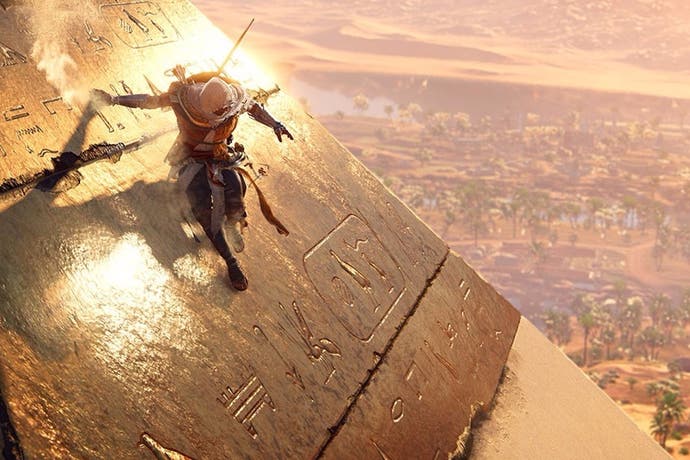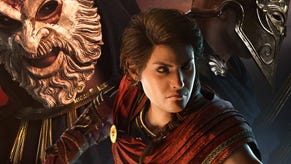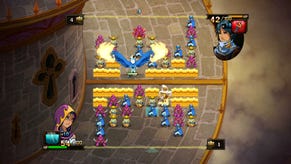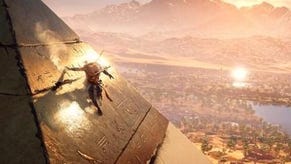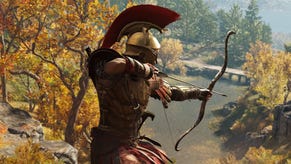Assassin's Creed Origins review
Ankhs for the memories.
We know quite a lot about what the Ancient Egyptians made of death. Their opinions regarding life, however, often seem more elusive. This could have posed something of a problem for Assassin's Creed: although my first thought of this series is always of death dropping down from on high as darkness suddenly swirls and engulfs, my second, more considered memory, is generally one of life - mad, rickety, often hilarious life. The teeming, thronging cities of civilisation, messy history wobbling forth in the form of crowds, of bystanders, of onlookers, of thieves and killers and victims. This life is sometimes buggy and precarious - in Assassin's Creed, you can sometimes have no face, just a grin and some floating eyeballs and yet you can still be alive - but there's always something of a cheerful miracle to it. These games bustle. They bustle with life.
Perhaps this explains why the developers have been so canny with the dates as they take the series back into the ancient world. There's a moment early on in Origins where Bayek, the new hero, comes across some hieroglyphs. Hieroglyphs are an easy shorthand for antiquity when dropped into the 21st century; the interesting thing here is that they're a shorthand for antiquity to Bayek, too - he has to work a bit to remember how to read them. This, then, is Egypt as it was a mere 50 years before the birth of Christ. The rulers are of Greek lineage now. The Pyramids? They're already unfathomably old, limestone facades pockmarked and crumbling away in the corners, good for parkour but also a bit tatty and knackered. The huge statues of pharaohs that we see in museums these days, often missing an arm or a leg, are often already missing an arm and a leg here too. Sometimes Bayek will be the one to de-limb them.
Opting for the reign of Ptolemy XIII means Ubisoft gets to have it both ways, in other words: you get the sheer scale of Egypt, but you also get the melancholy of its specific greatness receding into folk memory. You get the violence and confusion as a declining empire finds itself squeezed between powerful international players (you also get some rather timely stuff on the way a nation in decline will debase itself in bitterness and xenophobia) and you get tart sibling rivalry for the big chair, a brother and sister fighting it out in private and in public. Oh yes, and in the streets you get people worn down and sometimes driven towards darkness by the sheer weight of political, economic, and cultural uncertainty. You get moderns, in other words, and we already know intimately how moderns feel about life.
Egypt does an awful lot for Origins. It gives the game a charming new lead in the form of Bayek, for starters. Bayek's a fiercely capable Medjay - a proud pharaonic militia, I gather, which means Bayek operates a bit like a sheriff and a bit like a general problem solver for the community. Early on in proceedings, Bayek's set on the path to vengeance when events in his home town leave him tracking down and killing a group of masked cultists who have dispersed across the land. It's grim stuff, but with Bayek as the lead, the game is able to walk a neat line between bloodletting and something a bit more, you know, cheerful. He is driven by death, but he cannot entirely set aside his love of life. (His wife Aya is even better, incidentally, a full-blown secret agent with mysterious alliances. As good as Bayek is, it's a shame she's not the lead.)
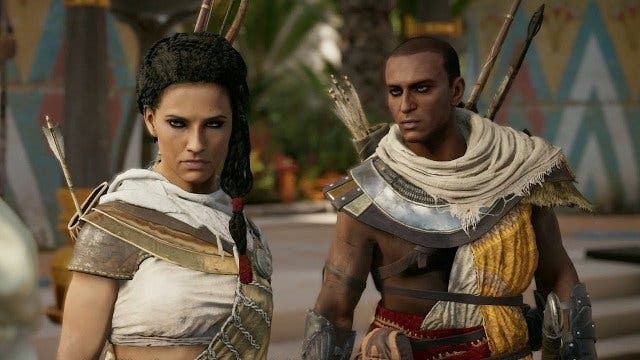
More importantly Egypt also gives Bayek a brilliant new playground in which to hunt his targets and unravel his conspiracies. It's a reminder that, as the Assassin's games have crept closer to the present day, they have also grown increasingly fiddly. Before playing Origins I stepped back into Syndicate a little, and I was surprised at how messy it could be navigating those narrow lanes and how dull it got scampering up the bland brick faces of all those townhouses. Egypt is a return to the kind of landscape that gave the series its brilliantly streamlined parkour in the first place, the kind of landscape where this stuff makes sense. So parkour's back to a one-button affair here, and all the better for it, and it's a pleasure to watch Bayek move through the game, scrambling over simple shacks and climbing rickety lookout towers, sneaking through reeds and wheat fields, scaling the sheer sun-bleached walls of the giant temples that give a focal point to all but the smallest of villages, and perching on top of giant statuary - the body of a man, the head of a jackal perhaps: Anubis!
Egypt has scale - the map by the end of the game is still dauntingly vast - but crucially it also has range. It has mountains and canyons where bandits have made their hideouts. It has cities, like Alexandria and Memphis, where broad bridges cross canals and the wonders of the world might lurk in the next open square. At times, Origins' urban sprawls can feel a bit too close to the ground-hugging settlements of the first Assassin's Holy Land, or even the Renaissance cities of the series' most successful outings, but then, in the middle act, Bayek arrives at Giza and the Egypt of the properly ancient ancients reasserts itself in ways that are far too good to spoil here.
This Egyptian tale is not the only story being told, however. Syndicate arrived in 2015 and then, for once, there was no big budget Assassin's game released the following year. Origin is the result of a four-year development, and it's also unmistakably the series' response to a playerbase that had started to grow weary of the kind of incremental changes that an annual release cycle imposed - and of the silt of ritual and outdated design that had inevitably accrued. In a way, Assassin's was a bit like Ptolemaic Egypt, I guess: tired out and tethered to past glories, and encircled by powerful new rivals. (I doubt Ubisoft invited this comparison on purpose.)
Origins has a handful of responses to all this. Firstly, it's completely overhauled the combat system, ditching the cludgy old scrums that relied on heavily-repeated animations and that favoured counters above all else, for a hit-box system that gives you a sword and a shield and a dodge and a parry. It makes for far more organic and engaging combat, as you dart about enemies slicing away with a light, quick attack and a heavier defence-breaker, and it encourages you to use more of the space around you as you move in and out of a fight, prioritising between a handful of enemy types who each pose their own threats.
Combat's further enlivened by a fully-fledged loot system, which sees enemies dropping new kinds of weapons and shields for you to pick through. This means you can swap out a breezy sickle sword for a heavy mace that is slow but devastating, or twin-blades that look a bit like the tools a plasterer uses but allow you to carve enemies up with a flurry of quick bursts if you can get close enough. (Bows are similarly varied: I had one that worked a bit like a semi-automatic, and another that fired five arrows at once in a shotgun-style spread.)
All loot has its own stats, and the better pieces will have unique traits too. I got through a lot of the game with a sickle that had an increased chance of critical hits and also encouraged bleeding. I swapped it briefly for a cursed blade that did amazing damage, but took out two of the three chunks of my recharging health, so that one had to go.
Loot can be bought and sold or broken down to scrap, and you can also pay at a blacksmith to have it improved at which point it gets a stat boost. It's all very nicely done, but it does serve as a reminder that Assassin's is getting further away from stealth as it ages, and is now far more comfortable with open confrontation. Sneaking is still supported, of course, and there are some areas in which you'll want to move slowly and carefully and avoid being seen, but fostering proper stealth in a game's design is a bit like trying to grow your own coriander: you don't just whack things in place and give them the opportunity to flourish, you have to go out of your way to encourage them, to nurture them. Stuff like Origins' new adrenaline system, which sees you building up a meter through the laying on of damage before you can unleash weapon-specific specials, suggests that the series has embraced a different kind of pleasure to the rarified and guilty joy offered by tracking someone for ten minutes and then offing them with an audacious leap from the rooftops at the exact moment that nobody is looking. While Origins' combat is very enjoyable, it may struggle to stand out from the crowd.
The other big tweak comes in the form of a far more central role for the RPG-like levelling system that's been introduced of late. It seems to me that you can pick up XP far more regularly throughout the basic things you're doing in the game world than you could in Syndicate, although you still get it in bulk for completing missions. I suspect the team has let the levelling go to its head a little this time. All Assassin's games have grind, but this is the grindiest one I can remember, as Bayek vacuums up side-quests in order to meet the ever-advancing level criteria for the big story missions. Going in underleveled means higher-level enemies are going to give you a very hard time indeed, and if the level gap is too large, even a stealthy assassination from above won't do much to dent a baddy's health. Drop back too far, and you're going to face missions you just flat-out can't handle yet.
On the plus side, this XP flows into a skill tree with three branches divided across Warrior, Hunter and Seer disciplines and filled with brilliant stuff like sleep darts, the ability to tame predator animals, and a neat ability that allows you to turn corpses into plague bombs. It also means that even the most focussed player is going to see more of the game's range as they're driven away from the main campaign to level up. The problem, though, is that when it comes to side quests the game doesn't actually have much range to speak of. Egypt lends a hand to a certain extent, of course, with stories of poisoned crocodile gods and dodgy embalmers, but Assassin's designers only have a handful of different mechanics to shuffle through. There are investigation sequences where you take in a scene and click on nearby icons until Bayek's solved the mystery. There are hunting sequences in which absolutely nobody's going to be truly happy until someone's been given a heron's feather or a set number of alligator's ears. There are camps to be looted, and occasionally someone to be escorted, and many missions then end with an assassination or a huge fight. Repeat.
 32 minutes of NEW Assassin's Creed Origins gameplay - COW CRIMES, CAMEL RIDES AND SURPRISE SAUSAGES!
32 minutes of NEW Assassin's Creed Origins gameplay - COW CRIMES, CAMEL RIDES AND SURPRISE SAUSAGES!
There is a lot of this stuff to do, which is absolutely great if you're after a return on your initial investment. The huge map is filled with targets to loot, garrisons that contain high-ranking officers to kill, animals to hunt to feed a rudimentary crafting system that improves your gear, and papyrus puzzles to locate and solve (these are excellent, incidentally: a riddle that will point you to a position on the map where a really nice treat is to be found). But all these things quickly grow rather samey, and even the most wayward of players will find that enforced levelling interruptions break the flow of the main campaign. Granted, it can be quite tricky to get a sense of how an Assassin's game should actually be played when you're reviewing it in three days rather than allowing yourself to dive in and out, as I suspect is actually intended, over the course of a lazy holiday. Even so, I worry Origins has allowed the new implementation of levelling to mess a little too much with the pace of things.
All of which sounds quite negative, but in truth I really enjoyed a lot of Origins. The main campaign missions are often excellent, and the phenomenal thrill of exploring Egypt can return very suddenly when you round a dune and see a pyramid, or when Aya tells you to meet her outside the library in Alexandria and you realise - oh cripes - it's that library. The game's political factions are characterised in interesting ways, a nice fast mount - camel or horse, they're all basically the same - is never more than a whistle away, and it's wonderfully easy to have the simplest task interrupted by the unplanned arrival of crocodiles or hippos, or by setting yourself on fire when you really didn't mean to. Even the modern day strand to the narrative, which I will not spoil, is excellent, managing somehow to be both focused and gleefully gratuitous in terms of its fan-service. It's a reminder that the genius of Assassin's Creed is not just that it takes you back to the past, but that it takes you back to the past as Assassin's Creed would have it, which means it's a past littered with unnatural artefacts, a past in which the great secret societies were not just old men's drinking clubs, and a past in which Ubisoft is able to be highly partisan, in this case focusing in very clearly on the neglected role of women in history.
Ultimately, though, there's an underlying threat eating away at much of this, and it's something that the Egyptians of Ptolemy's time would have been aware of in their own way, even though they would not have recognised its modern name, which is syncretism. Syncretism, and I hope I have this right, refers to the steady, inexorable blending of multiple religions into one - and while game design isn't a religion, it sometimes feels a bit like it is, particularly when you're in a Ubisoft open-worlder. And, oh man, just as Egypt in the years before the birth of Christ was surrounded by up-and-coming rivals with their up-and-coming gods, it can be hard to keep track of where Assassin's ends and other open-world games, many of them also made by Ubisoft, begin. A couple of examples: to accommodate the loot, Origins has borrowed Destiny's menu system, just as it's borrowed a kind of Xur figure. Bayek, meanwhile, gets the lay of the land before each mission by scoping it out with an eagle - upgradable by synchronising at towers, of course - that acts like a drone as it hovers and marks targets and can even be fitted out to harass them. At times, I can't remember what came from where, whether Origins is stealing the system in which a circle contracts as you hunt for targets from above, say, or whether it's using a system which it invented and someone else subsequently stole. Either way, everywhere you look in Origins you'll find things that you have done in other games, probably quite recently. And as these games converge, they all get a little more interchangeable, and a little blander.
For now, what saves Origins is something else it shares with Egypt: its mad ambition and grandiosity. This is a vast game that plays out on an improbably huge and detailed canvas. Having finished the campaign I am more than aware of all the stuff I have missed. The camel races I neglected, the arena fighting that I didn't have the time for, the chances, perhaps, that a truly hilarious bug is out there somewhere. (On the bug front, I had four crashes back to the PS4 home screen, a few facial glitches, and a moment where a heron flew by under the sand; annoying - except for the heron, which was a delight - but mild by the series' standard. Oh, and it does seem that whenever you fast travel to a new location, the nearby traffic has its equivalent of a cat's golden hour: horses race past at double speed and often plough into walls before trotting off, as if the world was unprepared for your arrival.)
Last night I moved in on the final boss fight. Then, I moved past the final boss fight and into the most bizarre endgame I can imagine in a big budget affair. And it was bizarre because of the scale Ubisoft was willing to reach for, even now, the places it was willing to take me, even at the end of an adventure, and its sheer unwillingness to stop making improbably lavish new stuff. As dawn rose, I wondered whether this would ever end, and I realised that I didn't really want it to. Assassin's Creed remains a wonderfully foolhardy game in terms of its ambition and its generosity, even if it it is no longer quite as distinct as it once was.
